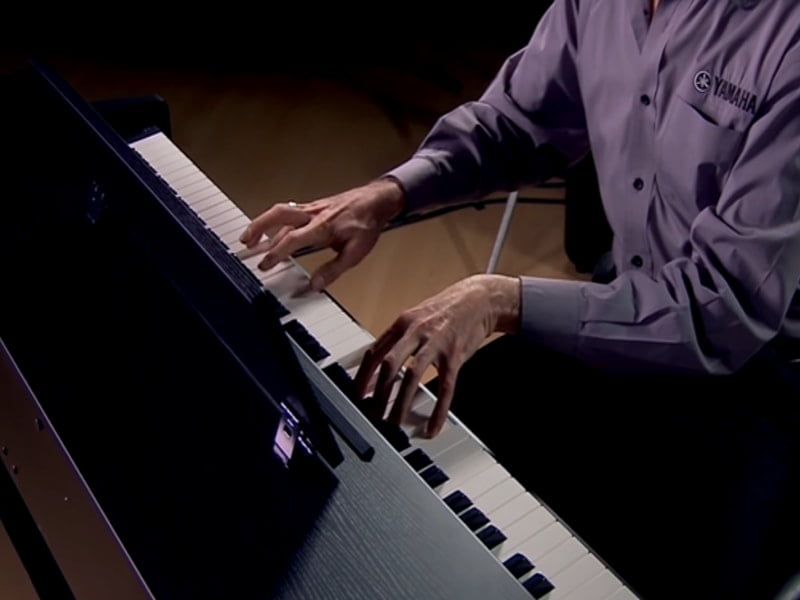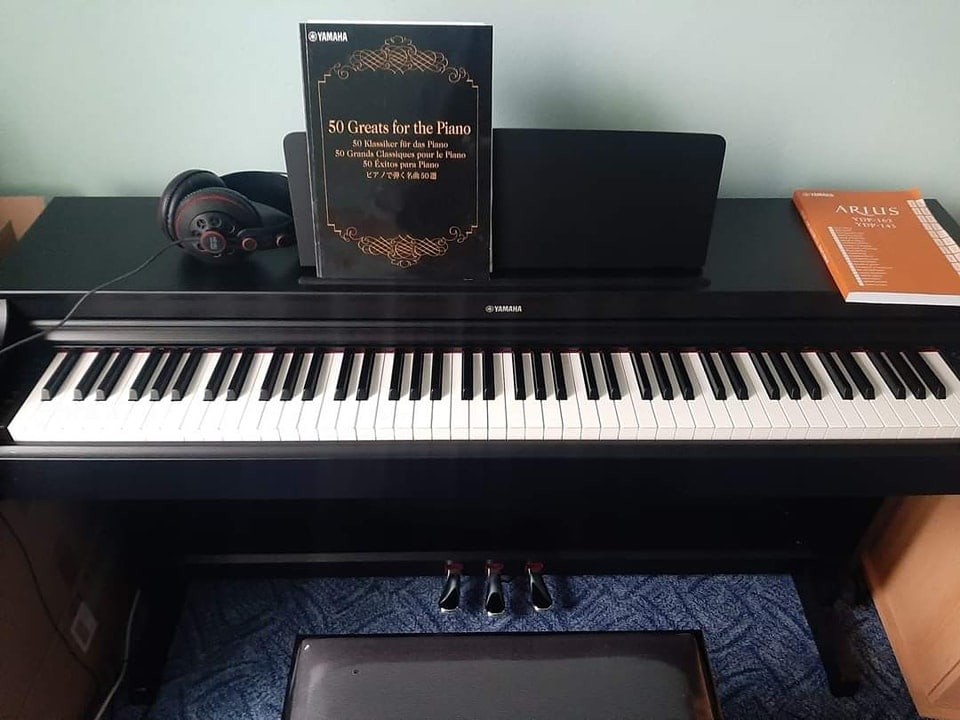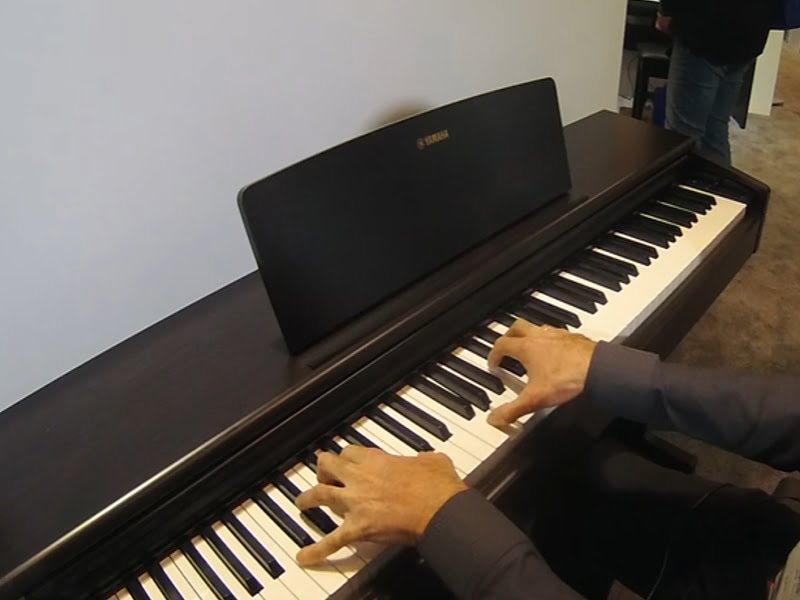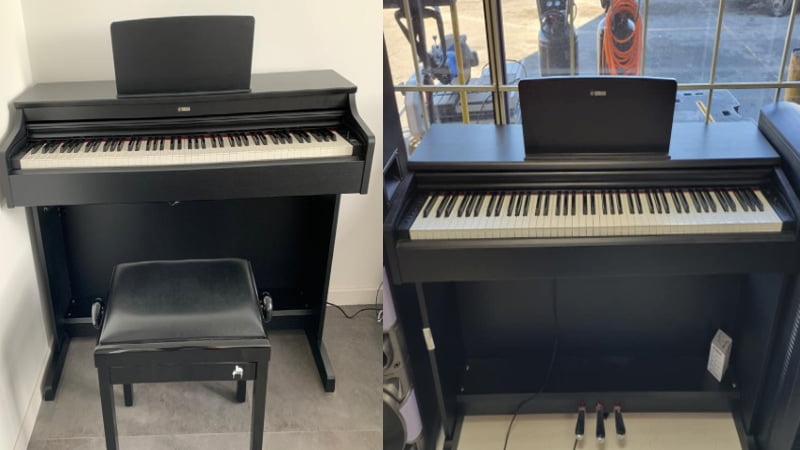In the Arius series, most choose between Yamaha YDP144 vs 163. The latter, considered the top of the line, is the clear winner. Does YDP144 stand a chance?
Yamaha, perhaps the most celebrated piano manufacturer today, has come up with a more affordable alternative to their world-famous Clavinova – the Arius. This is perfect for beginners and intermediate-level pianists who are on a budget but are looking for a high-quality piece to practice with at home.
The company has six non-portable models which they constantly develop to catch up with the times. Two of these, the subject of our review, are the YDP144 and the YDP163. The latter is one of the series’ premium options while the former is a mid-range variant both in cost and quality.
Most would naturally lean towards the YDP163, thinking that there would be numerous enhancements to justify its hefty price tag. The YDP144, on the other hand, is several hundred dollars cheaper. In the Yamaha YDP144 vs 163 match-up, I would go for the former mainly because of cost considerations. But if you want to know all specific details about these Arius models so that you can make a better decision, continue reading on.
Yamaha YDP144 vs 163: Comparison Chart




Last update on 2025-04-14 / Affiliate links / Images from Amazon Product Advertising API
Yamaha YDP144 vs 163: A Detailed Comparative Report
Since the Arius series was made as an affordable substitute to the Clavinova, you can expect a whole lot of impressive features and functions from any of the digital piano models under it. And although the YDP163 is tagged as the premium option, it actually isn’t that different from the YDP144.
At first glance, the two are almost similar – large cabinet-style digital pianos that come in various wooden finishes. The YDP163 is slightly bulkier with a more classical feel that would look great on stage but some do comment that the YDP144 is equally elegant. Even most of the specs are the same, from the number of the pre-recorded demo songs to the installed sound effects.
What really sets the YDP163 apart from its Arius sibling are three things: better keys, enhanced sound engine, and higher amplification.
One could argue that the upgrades found in the YDP163 is worth the extra $500. Besides, if you have the money, there is no reason not to splurge. But when all things are considered, the more affordable, mid-range model wins 3:1 in the Yamaha YDP144 vs 163 face-off.
Feel and Playability
The Winner: YDP163
After three revamps (from YDP160, 161, and 162), Yamaha finally decided to bump up the functionality of the piece and came up with the YDP163. Most of the changes made are focused on the feel and playability.
Several upgrades were made to create the YDP144, with predecessors 140, 141, 142, and 143. It is just as highly acclaimed but it doesn’t live up to the improvements of its competitor. That is why the YDP163 still comes out the victor in this particular component.
+Hammer Action
The YDP144 is equipped with Yamaha’s customary GHS (Graded Hammer Standard) action. This basically means that the left-most side of the piano has heavier keys than the right-most end. While this is much better than regular weighted keys in simulating the hammer pull of a real acoustic piano, it is nowhere close to the GH3 (Graded Hammer 3X) found in the YDP163.
YDP163’s GH3 is exactly the same hammer action used in entry-level Clavinovas. It is slightly heavier when pressed and has more resistance, giving players more control and expression when they play.

+Touch Sensitivity
Playing the piano is all about expression, hence the massive importance of touch sensitivity on digital pianos. Both these Arius share the same levels: Soft, Medium, Hard, and Fixed, so they are basically neck and neck in this regard.
+Key Texture
The keys on the YDP144 are made of plastic but were given a matte finish. This is Yamaha’s way to ensure better playability while lowering the costs. The ones on YDP163 are way more exceptional since these were made of synthetic ivory. And just like the real deal, the material can also absorb moisture, providing better grip while playing.
Tone
The Winner: YDP144
Considered the industry leader in digital piano production, Yamaha’s sound engines are always enviable. And with their incessant model redevelopments, the company always outfitted their newer pieces with the most state of the art mechanism to ensure better tone. The YDP144 dominates in this segment mainly because it was equipped with an improved sound engine while the 163 was left with the second best thing.
+Tone Generator
The sound engine on the YDP144 is the CFX, sampled from one of the world’s best concert grands. Its highs are incredibly crystal clear and the lows are rich and resonant.
On the other hand, the YDP163 makes use of the Pure CF. No one can deny that this is still a great tone generator but the former is more superior. In fact, Yamaha rigged the Arius 164, the 163’s successor, with the CFX sound engine.
+Sound Library
The two Arius have 10 voices. The YDP144 consists of three acoustic pianos, two electric stage pianos, three organs, a harpsichord and a vibraphone. The YPD163 has almost the same listing, except that one of the organs is replaced with a set of strings.
Each also has 50 pre-recorded piano songs. However, the latter has an additional 10 demo tracks.

Piano Functions and Features
The Winner: Tie
Except for external design features, the YDP144 and 163 share almost the same internal functions. And although one disparity makes the former better than the other, another difference does the opposite, equalizing things once more. This is why I believe that the two are evenly matched in this section.
+Polyphony
Defined as the capacity to play numerous notes at once without cutting a single note off, polyphony is a must-have in digital pianos.
The two featured instruments have 192-count polyphony – great even for expert players. However, for a supposedly top-ranking piece, the count on the YDP163 seems a bit short – especially when its competition from other brands have 256.
+Playing Modes
Both Arius models have two out of the three important playing modes: Duo and Dual. Duo, also known as Twin or Lesson, bisects the 88 keys into two 44-keyboard that plays the same octave range. Dual is the mode that can layer two or more different voices at the same time.
+Effects
Just like the first two features, there isn’t a lot of difference between the two Arius in this section as well. Both have four kinds of Reverb, Intelligent Acoustic Control, Stereophonic Optimizer, Damper Resonance, among others.
+Recording Capability
Although the two are console-style digital pianos, Yamaha threw in a recording function to allow the user to capture their practice sessions or compositions. Both can record two tracks in standard MIDI format. The tracks are modifiable via the app.
+Connectivity
This isn’t an arranger so don’t expect too much from either models in terms or connectivity. Most of the functions can be operated on the app when connected to the piece via USB. This is much easier than pressing the panel buttons, especially with the YDP163. Both also come with two headphone jacks of different sizes.
+Speaker System
The cabinets on both the YDP144 and 163 are so well-made that the sound resonates much better through the wood. However, the latter has a more remarkable amplification with a total of 40W power. And despite the intensity, the sound is rich even in the lower register. The former only has 16W speakers.
+Accessories
Depending on where you live, the two Arius come with the cabinet set-up with is quite easy to assemble, a three-pedal system just like a real acoustic piano, a music book, and even a matching bench.
But the YDP163 comes out the better option when it comes to accessories because of tiny details that would be of great help to users. For instance, it has a headphone placeholder and little plastic arms on the music rest that prevents pages from accidentally flipping over. The music rest is also foldable.

Yamaha YDP144 vs 163: The Similarities
When simply browsing through the features and functions one by one, it’s easy to say that the big brother Arius wins in the YDP144 vs 163 match-up. Who wouldn’t want a higher quality key mechanism and boosted sound system?
But the truth is, the two have too many similar components. And unless you’re willing to spend extra on a whim, it’s better to splurge on the next versions – the YDP 164 or 165. And to be perfectly honest, you’ll get more bang for buck on a Clavinova.
Quick Rundown of the Yamaha YDP144
- Your purchase includes One Yamaha Arius Series, YDP144 model | Bench, 50 Classical Music Masterpieces Book, Owner’s manual & Quick Operation Guide
- Piano dimensions – 53-7/16” W x 32-1/16” H x 16-5/8” | Weight – 83 lbs. | Number of pedals – 3 | Max polyphony – 192 | Number of voices – 10 | Headphones – (2) Standard Stereo phone jack | With Recording and Playback capabilities
- GHS weighted action is heavier in the low keys and lighter in the high keys, just like an acoustic piano
- Half-damper pedal control allows for continuously increasing amounts of sustain as the pedal is depressed
- The CFX Premium Grand Piano Voice recreates the power and tone of the flagship CFX concert grand piano from Yamaha
Last update on 2025-04-14 / Affiliate links / Images from Amazon Product Advertising API
Quick Rundown of the Yamaha YDP163
- The Pure CF Sound Engine faithfully reproduces the tone of a meticulously sampled, acclaimed Yamaha 9' CFIIIS concert grand piano, allowing for incredibly dynamic and expressive playing.
- Graded Hammer 3 (GH3) weighted action provides increasingly heavier touch from the high keys to the low keys, with grand piano-style response and an outstanding dynamic range.
- 50 classic piano songs are provided in the built-in song memory as well as in a music book, "50 Greats for the Piano."
- The Controller App for iOS devices adds a rich graphical user interface, allowing for quick and easy navigation and configuration.
- The 2-track song recorder allows players to practice one hand at a time, or record their next hit single!.No of pedals:3
Last update on 2025-04-14 / Affiliate links / Images from Amazon Product Advertising API
Product Videos
Related Articles to Yamaha Ydp 144
- Yamaha YDP144 vs YDP-144R: What’s the Difference?
- Yamaha YDP-144 vs YDP-S54: What’s the Difference?
- Yamaha YDP-144 vs 184: Which Is the Best Arius Model for the Money?
- Yamaha YDP-144 vs YDP-181: Is the YDP-144 a Worthy Upgrade?
- Yamaha YDP-144 vs Roland F-140R: Which Digital Piano Do You Need?
- Yamaha YDP-144 vs Kawai KDP-120: Which Piano Is the Best?
- Yamaha YDP-144 vs Kawai KDP-110: Why the YDP-144 Is the Better Piano
- Yamaha YDP-144 vs 164: Which Is the Better Arius Piano?
- Yamaha DGX-660 vs YDP-144: Which Is the Better Yamaha Piano?
- Yamaha DGX-670 vs YDP 144: Finding the Best Digital Piano
- Yamaha YDP144 vs S34: Which Suits Your Style Better?
- Yamaha YDP-143 Vs 144: Is The YDP-144 A Worthy Upgrade?
- Yamaha YDP-103 Vs 144: A Battle Of Two Arius Models
- Casio PX-870 Vs Yamaha YDP-144: Which Is The Better Console Digital Piano?
- Casio PX-770 vs Yamaha YDP-144: Which Is The Better Digital Piano?
Related Articles to Yamaha Ydp 163
- Yamaha DGX-660 vs YDP-163: Which Is the Better Piano?
- Casio PX-870 Vs Yamaha YDP-163: Which Digital Piano Is The Better Option?
References:
- Yamaha YDP144: https://usa.yamaha.com/products/musical_instruments/pianos/arius/ydp-144/specs.html#product-tabs
- Yamaha YDP163: https://usa.yamaha.com/products/musical_instruments/pianos/arius/ydp-163/specs.html#product-tabs
Lulacruza is an electronic folk duo operating at the junction of the hypermodern and the ancient. Our music weaves together hypnotic female singing, South American folk instruments and electronic processing, while channeling pulsating waves from the source of creation.
Lalucruza is also a community where you can connect with other music lovers to collaborate, exchange ideas and share knowledge. A platform for who wants to learns the basics of playing piano, guitar, drum masters’ technique, etc.. is the premise of our website.
